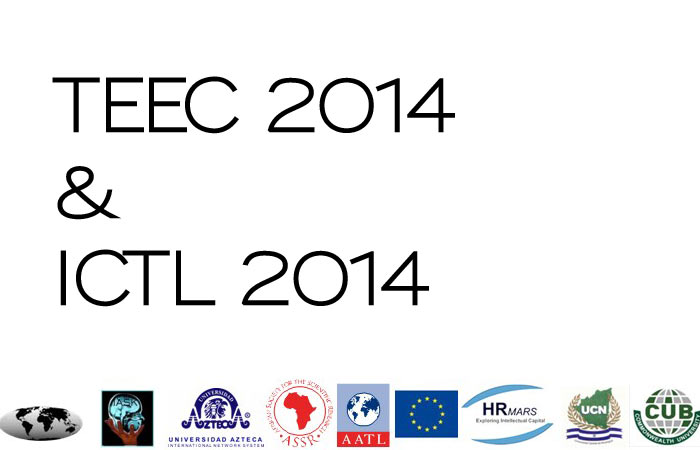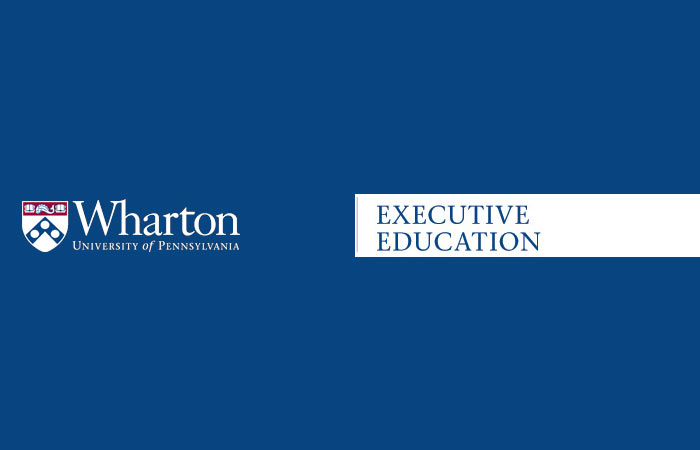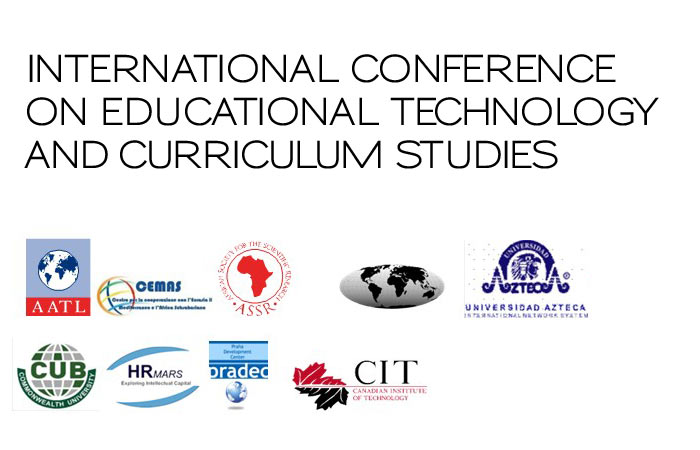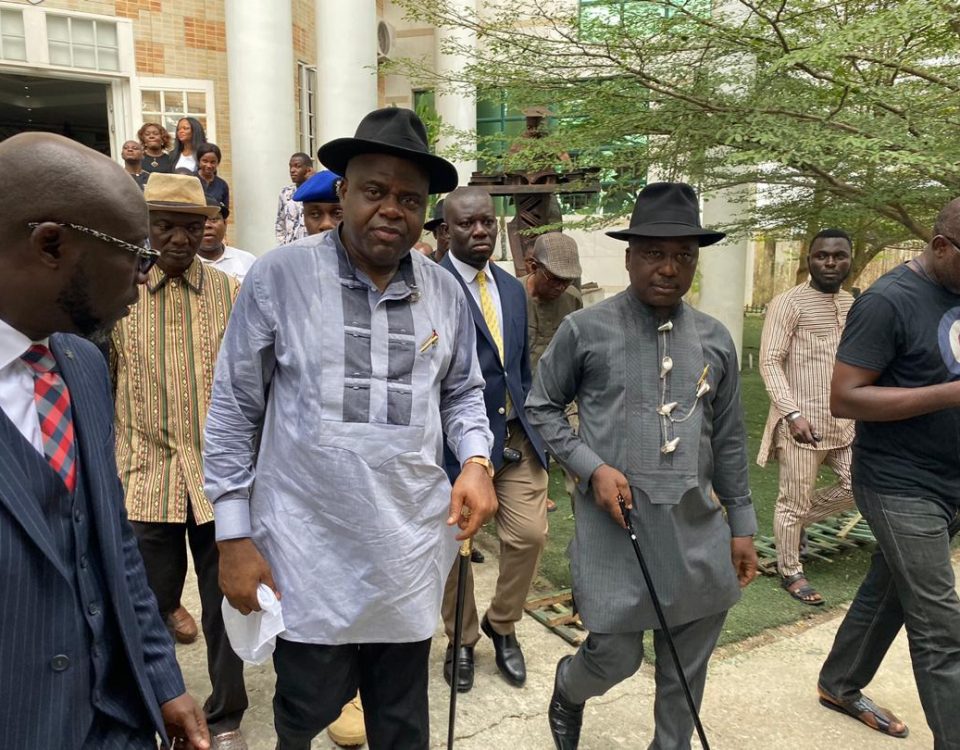
TEEC2014 & ICTL2014
August 2, 2014
Accelerate Your Professional Growth at Wharton
August 6, 2014INTERNATIONAL CONFERENCE ON EDUCATIONAL TECHNOLOGY AND CURRICULUM STUDIES
Venue: FCT Education Resource Center,Abuja-Nigeria
Date : October 13 – 16,2014
Guest Speaker:Professor Mohamed Elsabawy, Minia University, Egypt
Sub-Themes
- Cloud computing
- Collaborative technologies
- E-publishing/digital libraries
- Learning management systems
- Learning portfolios
- Mobile teaching and learning technologies
- Shared online video
- Social networks
- Videoconferencing
- Web 2.0 (podcasting, wikis, blogs, etc.)
- Alternative & innovative assessment
- Assessment in cross-cultural research
- Best practices in assessment/evaluation
- Performance and outcome assessment
- Contextualized innovation
- Scalability, usability,& sustainability
- Education reform with technology
- Government initiatives and programs
- Technology Policy issues and trends
- Quality assurance and accreditation
- Teacher education & technology integration
- E-learning benchmarks and standards
- Evaluating for quality improvement
•Asynchronous Learning
•Authoring Technology
•Best Practices In ICT Classrooms
•Constructivist Perspectives
•Cooperative/Collaborative Learning
•Data Mining Strategies For E-Learning Organizations
•Diffusion Of Innovation
•Distance and Open Learning
•Educational Technology & Globalization
•E-Portfolios
•Human Resources In Educational Technology
•Hypermedia Applications
•ICT Integration
•ICT Literacy In Education
•Improving Classroom Teaching
- Instructional Materials and Design
- Active Learning and Blended Instructions
- The Classroom and New Learning
- Technologies, Strategies and Methods
- Software, Games and Simulations
- Vocational/Technical Education
- Educational Projects and Innovations
- Experiences in Learning
- Virtual Technologies
- Learning Objects and Technology
- Asynchronous Learning
- Content Management Systems
- Innovative Teaching Strategies
- Learning Management Systems
- Online Assessment
- Online Collaboration
- Online Forum Discussion
- Smart-Board Teaching
- Table of Specifications
- Virtual Classrooms
- Digital Libraries
- E-Learning Strategies
- Curriculum Design
- Networks, Partnerships, and Exchanges
- Competencies and perspectives
- Courses, programs, degrees, and initiatives
- Learning barriers, challenges, and concerns
- Learning communities/Environments
- Learning partnerships and innovations
- Innovative Approaches to Learning
- Contextualized & real-world learning
- Case, Scenario & Project -based learning
- Collaborative learning
- Communities of practice
- Electronic Performance Support Systems
- Game-based learning
- Learner-centered, and self-directed learning
- Learning management and support systems
- Lifelong, informal & nontraditional learning
- On-demand and just-in-time learning
- Participatory learning and media
- Personalized learning environment
- Virtual reality learning environments
- Free and open source software
- Learning portals
- Localization of content and knowledge
- Online language learning
- Open access publishing
- Open courses, learning, and open resources
- Publishing, copyright and other legal issues
- Open projects, partnerships, and consortia
- Participatory/contributory communities
- Socially Responsive Learning
- Digital divide issues, initiatives, and cases
- Digital and social media for engaging youth
- Ethical, cultural, historical aspects
- social issues in technology use
- Education online films,
- Documentaries, news, & other media
- Learning technologies for change
- Rural community learning and technology
- Technology solutions for the marginalized
- Technology uses in multicultural contexts
- Flexible learning/Training
- Innovative online learning & programming
- Mobile and ubiquitous learning
- Online learning environments
- Mobile Communication Services
- Agents and Multi-Agents systems for ICT
- Antennas & Propagation
- Artificial Intelligence / Expert Systems
- Bioinformatics and Scientific Computing
- Environmental Technology
- Broadband & Intelligent Networks
- Business Information Systems
- Econometrics
- ICT Systems and Networks
- Complex Systems: Modeling
- Computational Intelligence Applications
- Computer Vision & Pattern Recognition
- Data Base Management
- Data Generation and Data Fusion
- Data Warehousing, Ontology &Databases
- Distributed Sensor Networks
- E-Commerce & E-Business
- Mining Technology
- E-Government & E-Working
- E-Health & Biomedical Applications
- E-Learning & E-Collaborations
- Emerging Technologies & Applications
- Ethical &Legal issues in Environment
- Evolutionary & Genetic Algorithms
- Fuzzy Logic & Systems
- Fuzzy, ANN & Expert Approaches
- Human-Computer Interaction
- ICT & Banking
- ICT & Education
- ICT & Intelligent Transportation
- ICT in Environmental Sciences
- Image & Multimedia Applications
- Image Analysis and Processing
- Information & Data Security
- Information Indexing & Retrieval
- Information Management Systems
- Information Processing
- Information systems & Applications
- Intelligent Computing Systems
- Internet Applications & Performances
- Knowledge Based Systems
- Time Management
- Knowledge Development
- Decision Making
- Machine Learning Technologies
- Machine Vision & Remote sensing
- Management Information Systems
- Geographical Information Systems
- Mobile Networks & Services
- Mobile/Wireless Computing
- Natural Language Processing
- Network Management and Services
- Networking Theory & Technologies
- Neural Networks Applications
- Next Generation Network
- Optical Communications
- Parallel and Distributed Computing
- Protocols and Standards
- QoS Management
- Real-Time and Embedded Systems
- Robotic Technologies
- Satellite & Space Communications
- Security and Cryptography
- Semantic Web Applications
- Signal & Image Processing
- Systems & Software Engineering
- Virtual workforces
- Web Engineering
- Wireless Communications
- Emerging Technologies in Education
- Engineering Education and Sustainability
- Innovation and Good Practice
- Learning and Teaching Methodology
- Media Production
- Computer Software in Engineering
- Mathematical and Statistical Applications
- e-Learning Tools and Developments
- Computer Science in engineering
- Web-based Learning
- Elect/Electronics Engineering Education
- E-Learning & Classroom Learning
- Mechanical Engineering Education
- Technologies of Virtual Education
- Chemical Engineering Education
- Environmental Dynamics
- Computer and Web-based Software
- Ethical Issues in Engineering Education
- Virtual Environments for Education
- University-Industry Collaboration
- Digital Classrooms
- Innovation in Engineering Education
- Multimedia in Engineering Education
- Current and Future Trends and Directions
- Historical Foundations and Heritages
- Philosophical Issues of Education
- Sociological Perspectives
- Psychological Aspects
- Political Dimensions
- Legal and Institutional Issues
- Education Practice: Issues and Experiences
- Economics/Management of Education
- Indigenous Education
- Internationalization and Globalization
- Adult Education/Life-Long Learning
- Distance Education and Open Education
- E-Instruction, Virtual Education and Learning
- Technologies, Strategies and Methods
- Modeling, and Learning
- Organizational Learning
- Research and Development
- Online Systems and Forums
- Teacher Education
- Gender, Feminism and the Girl-Child
- Religious and Cultural Construction
- The School Principalship
- Teaching and Learning Projects
- Language, Mother Tongue and TL
- Quality, Testing and Assessment
- The Learning Society
- E-Society and Modernity
- Mathematics Education
- Studentship and Graduations
- Employment and Labour Dynamics
- Diversity, Barriers and Rights Issues
- Technology, Software and Games
- Pre-primary and Primary Education
- Intellectual Property and Copyrights
- Colonialism and Education
- Quality Assurance, Accreditation, Certification
- Vocational/Technical Education
- Physical Education and Sports
- Social Studies and Nationalism
- Business Education & Entrepreneurship
- Agricultural Education
- Music Education
- Fine and Applied Arts
- Home Economics/Management
- Health Education and Safety
- Population Education
- Teaching and Learning for Citizenship
- Military Education
- Architecture Education
- Science Teaching and Learning
- Cross-Cultural Studies in TL
- Educational Projects and Innovations
- Knowledge Management
- Higher Education
- The Private Sector and Education
- Education Networks/Cooperation
- Experiences/Experiments in Learning
- Secondary Education and Pre-University
- Remedial Programmes and Extra-Murals
- Engineering and Medical Education
- Legal Education and Human Rights
- Nomadic and Non Formal Education
- Education Policy Implementation
- Universal Basic Education
- Curriculum Planning and Implementation
- Monitoring and Evaluation
- Environmental Education
- Human-Computer Interaction
- Human Resources and Capital
- Libraries and Information Studies
- E-Learning, M-Learning and U-Learning
- Parenting/Homeschooling and TL
- Administration and Organization of Education
- Virtual Technologies, Objects and Classrooms
- Links and Experience Between Institutions,
- Industries and Local Community
- Teaching Status and Motivation
- School Plant and Objects
- Contemporary Issues and Concerns
- Comparative Analysis and Experiences
- Learning Objects and Applications
- Prospects and Challenges of Education
- The Learner: Past, Present and Future
- Special Education/ Learning Disabilities
- Authoring and Publishing Technology
- Pedagogical Issues and Experiences
- Rural Education
- Academic Advising and Counselling
- Kinesiology and Leisure Science
- Geographical Education
- Research Methodology
- Innovation and Change In Education
- Instructional Design
- Intelligent E-Learning Systems
- Intelligent Training Technology
- Interactive E-Learning Systems
- Interactive Learning Environment
- Knowledge Management In E-Learning
- Learning and Content Management Systems
- Learning and Teaching With Technology
- Learning Objects
- Life Long Learning and Technology
- Mobile Learning
- Multimedia Applications
- Network Based Education and Training
- Pedagogical and Practical Issues
- Pedagogical and Practical Issues
- Professional Development & Teacher Training
- Simulations In Education
- Teaching/Learning Strategies
- Video Games For Learning
- Virtual Classroom, Virtual University
Guidelines for Authors
The Full Text papers in MS Words should be submitted by one of the authors of the paper through email attachment.The submitting author takes responsibility for the paper during submission and peer review. All submitted formatted full-text papers should report original, previously unpublished research results, experimental or theoretical. Papers submitted to the conference should meet these criteria and must not be under consideration for publication elsewhere. All manuscripts should include the following information:Paper title,Full author names,Full institutional mailing addresses and E-mail addresses. When submitting manuscripts for potential publication in the conference proceedings, please submit an original editable file. All figures, images, tables, etc., should be embedded into the original file. The manuscript should contain an abstract with five keywords. The abstract should be self-contained and citation-free and should not exceed 150 words.One of the authors of the manuscript should sign the copyright agreement of their manuscripts.
Deadline for paper submission is October 1, 2014
CONFERENCE REGISTRATION
Conference Fees
| Conference Registration: | International | Local |
| Registration: | US $250 | N35500 |
| Registration at Venue | US$300 | N45500 |
| Corporate Participation | US$350 | N55000 |
NB: Payment in local currency is only possible for delegates resident in Nigeria. Authors whose paper(s) are accepted shall be informed of the bank details for payment registration.
Responsibility and Visa Requirements
In registering for the conference you agree that neither the Organizing Committee nor the Conference Secretariat accept any liability. For people from outside ECOWAS region planning to attend the conference, an entrance visa may be required and you should contact the nearest Embassy or Consulate for more information. Participants are requested to make their own arrangements in respect of health and travel insurance. The organizers do not accept responsibility for any personal injury, damage or loss of property which may occur in connection with this conference.
Conference Information
For any information, please contact the Conference Co-Chair,Professor M.O.N Obagah, Tel: +2348033392236; Email:abujaconference@gmail.com



